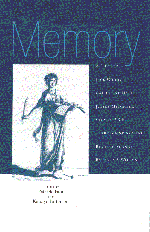Book contents
- Frontmatter
- Contents
- Introduction
- 1 Disturbing Memories
- 2 ‘Turning a Blind Eye’: Memories of Empire
- 3 Memory and the Making of Fiction
- 4 Memory in Oral Tradition
- 5 Memory and Psychoanalysis
- 6 When Memory Fails
- 7 How Brains Make Memories
- 8 Memory and Neural Networks
- Notes on Contributors
- Acknowledgements
- Index
3 - Memory and the Making of Fiction
Published online by Cambridge University Press: 05 June 2012
- Frontmatter
- Contents
- Introduction
- 1 Disturbing Memories
- 2 ‘Turning a Blind Eye’: Memories of Empire
- 3 Memory and the Making of Fiction
- 4 Memory in Oral Tradition
- 5 Memory and Psychoanalysis
- 6 When Memory Fails
- 7 How Brains Make Memories
- 8 Memory and Neural Networks
- Notes on Contributors
- Acknowledgements
- Index
Summary
I read somewhere that writers, or perhaps all artists, are haunted or hunted by unusually vivid memories of their early lives – as are the old, whose useful daily memories are decaying. Certainly I remember being obsessed as a child by a kind of ‘glittering’ quality about certain experiences, usually without deep importance in what I thought of as the narrative of my life – experiences excessively bright, strongly outlined, recognized so to speak as important, even when they were met for the first time. (Re-cognizedimplies memory, the existence of a former cognition.) It is not too much to say that these experiences were as tormenting as they were delightful, until I, the person who underwent them, formed the project of being a writer – because only the act of writing gave them a glimmer of the importance they had in life, and thus gave them a place, a form and an order which made sense of them. And which they seemed to ask for. Proust, at the beginning of À la Recherche du Temps Perdu, speaks of certain experiences which forced him to look at them – ‘a cloud, a triangle, a belltower, a flower, a pebble’ – and gave him, as a child, a sense of duty towards them, a feeling that they were a symbolic language which he ought to decipher.
- Type
- Chapter
- Information
- Memory , pp. 47 - 72Publisher: Cambridge University PressPrint publication year: 1998
- 2
- Cited by



